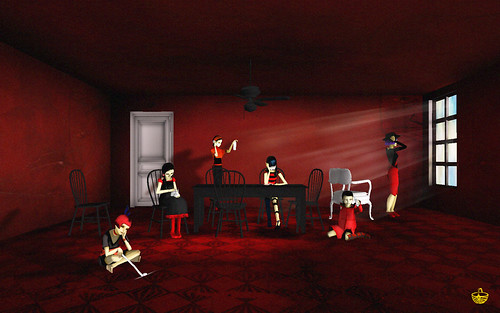Seinfeld voice: "What's the deal with walking sims?"
No seriously, what makes them or does not make them games?


Back in 2010, I played a game called The Path. It was, at the time, sort of an affront to what I expected or wanted from a video game. Not that I didn't like games that were all about visual or even gameplay ingenuity, but The Path was something different and not what I wanted: a game where you "do nothing."
Years later, who would have thought that the idea of a walking sim would be a full-fledged micro-genre? The genre has advanced far beyond on a technical level. On a gameplay level?
Of course not! And why should it? This is a genre defined by a lack of gameplay. That's where the contention and controversy come in: are these games and if they are games what is it that makes software a video game versus an interactive experience?
I'll stay neutral on my opinion on the genre, but I do have a definitive way to classify a game. In my view a game needs two major components:
A success or fail state.
Rules (mechanics) to success or failure.
A walking sim then only frustrates these categories but still adheres to them. Walking sims often do not have fail states and the "rules" are often reductive. Your only actions as a player are often only A) walk forward or B) do not walk forward -- sometimes you get an action button. The Path at least presents the choice to either stay on a path for a good ending or stray from the path for a not so good ending, sometimes a sim can be even more reductive giving no such option for linear and narrative progression.
Let's reframe a bit and put these parameters on another genre that sometimes receives undue criticisms, the simulation genre.
For the sake of clarity, let's talk about The Sims. Often the more hardcore crowds dismiss this series of games as simple toys. I contend they aren't, they're just games that lack a success state. There are ways to lose; your Sim dies. There are also mechanics: a series of tasks to make sure your Sim doesn't die. Thus, The Sims is frustrating because the majority games in the present day have both win and fail states, not one or the other. It is worth pointing out that older arcade games also have only fail states, but we give them a pass because of the competitive angle of achieving high scores and the more twitch based mechanics. Yet, arcade titles are just like simulation games: the best you can do is not lose.
A walking simulation then takes this approach but inverts it. There is no way to lose only win. This can be frustrating, we're, more or less, trained to accept that you either win or lose at a game. In a walking sim though there is still a finite conclusion, but no way to lose.
But even more aggravating to the gamer crowd are the lack of mechanics, or as I equate to as rules. These games are incredibly reductive, you don't do anything other than walking around and see what there is to see. Firstly, if you wanted to "do" something why did you buy Gone Home other than to downrate it? And there are still other games that are just as reductive but get a pass. Consider the game Slender, an internet phenomena for a couple months (which deserves hate for its far too many reaction videos). Slender also barely counts as a walking sim since you can both win or lose (technically only lose but you get the idea), but from a rules standpoint it is just as reductive as any game in the genre.
These games are incredibly reductive, you don't do anything other than walking around and see what there is to see. Firstly, if you wanted to "do" something why did you buy Gone Home other than to downrate it? And there are still other games that are just as reductive but get a pass. Consider the game Slender, an internet phenomena for a couple months (which deserves hate for its far too many reaction videos). Slender also barely counts as a walking sim since you can both win or lose (technically only lose but you get the idea), but from a rules standpoint it is just as reductive as any game in the genre.
Yet, I contend that there are still rules to these games. You still have agency as a player but your vocabulary and move set are critically limited. However, it is still well defined: walk forward, advance the game. Again, this challenges what we assume is acceptable for game design -- even though the genre is at this point fairly advanced.
So then what do we do if a game has no success or fail state and then has no "rules?" THAT is when we get out of the territory of a video game because the game is effectively undefined. A better example of a non-game than a walking sim is something akin to Gary's Mod, where there are no rules, no objectives, only a set of tools (see: Sandbox (see: the Grand Theft Auto series doesn't count as you can still lose in those sandboxes). A more experiential game like FlOw is also a far better non-game than the walking simulations. In FlOw there is no way to win or lose. The rules mostly arbitrary, the player is free to do whatever they want (play at their own pace). The closest walking sims get to non-games is akin to the highly experimental Proteus.

In a nutshell; yes, I am saying that Firewatch is as much a game as DOOM. The differences come down to expectations of mechanics and states of the game. To some people, overly mechanical games are as uninteresting as mechanical heavy games, no more or less "hardcore." This then also shows why I don't really consider walking sims to be... well, that experimental. If you deconstruct the language of the games, they aren't that different from more mainstream titles, they are another perspective on game design. Games like Rogue Legacy are far more interesting artistically and experimental because of the way they blend game mechanics with the game world leading into the metamodern and performative critiques that I often babble about. A walking sim, because of their reductive nature, misses on opportunities such as this.

Read more about:
BlogsAbout the Author(s)
You May Also Like












